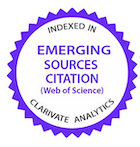Sobrevida das células espermáticas equinas criopreservadas após descongelação e diluição utilizando-se dois diluentes comerciais
Palavras-chave:
Reprodução AnimalResumo
O presente estudo teve por objetivo avaliar parâmetros de motilidade e viabilidade in vitro na diluição do crioprotetor dimetil-formamida a 5% pós-descongelação para concentrações de 2,5% e 1,25%, mediante utilização de dois diluentes comerciais adicionados junto ao sêmen. Após a descongelação, as amostras foram diluídas com a finalidade de manter as concentrações finais (2,5% e 1,25%) de crioprotetor, utilizando-se dois diluentes comerciais (FR4® e Botu-Crio®) em dois tempos: inicial (Ti) e final (Tf). Empregaram-se quinze amostras de ejaculados distintos de cinco garanhões de raças nacionais. Os parâmetros de motilidade foram observados através da análise computadorizada e os de integridade de membrana plasmática pela microscopia de epifluorescência. Verificou-se melhora nos parâmetros de motilidade total e progressiva dos espermatozóides, no tempo final (P<0,05) com o diluente Botu-Crio® em relação ao FR4®. Não houve diferença (P>0,05) entre os tratamentos quanto à integridade de membrana plasmática.PALAVRAS-CHAVES: Crioprotetor, congelação, descongelação, diluente, equino.
Downloads
Não há dados estatísticos.
Downloads
Publicado
2009-04-03
Como Citar
ZIMMERMANN, Marina Ferreira; FARINASSO, Adalberto; MELO, Cely Marini; PAPA, Frederico Ozanam; NEVES, Jairo Pereira. Sobrevida das células espermáticas equinas criopreservadas após descongelação e diluição utilizando-se dois diluentes comerciais. Ciência Animal Brasileira / Brazilian Animal Science, Goiânia, v. 10, n. 1, p. 238–245, 2009. Disponível em: https://revistas.ufg.br/vet/article/view/1932. Acesso em: 11 fev. 2026.
Edição
Seção
Medicina Veterinária
Licença
Copyright (c) 2009 Ciência Animal Brasileira / Brazilian Animal Science

Este trabalho está licenciado sob uma licença Creative Commons Attribution 4.0 International License.
Autores que publicam nesta revista concordam com os seguintes termos:
- Autores mantém os direitos autorais e concedem à revista o direito de primeira publicação, com o trabalho simultaneamente licenciado sob a Licença Creative Commons Attribution que permite o compartilhamento do trabalho com reconhecimento da autoria e publicação inicial nesta revista.
- Autores têm autorização para assumir contratos adicionais separadamente, para distribuição não-exclusiva da versão do trabalho publicada nesta revista (ex.: publicar em repositório institucional ou como capítulo de livro), com reconhecimento de autoria e publicação inicial nesta revista.
- Autores têm permissão e são estimulados a publicar e distribuir seu trabalho online (ex.: em repositórios institucionais ou na sua página pessoal) a qualquer ponto antes ou durante o processo editorial, já que isso pode gerar alterações produtivas, bem como aumentar o impacto e a citação do trabalho publicado (Veja O Efeito do Acesso Livre).


























